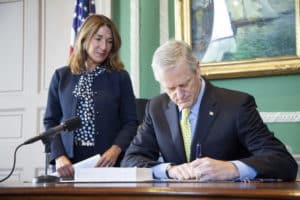
Gov. Charlie Baker signs the state's fiscal year 2023 budget at the State House on July 28, 2022 as Lt. Gov. Karyn Polito looks on. State House News Service photo
Signing his eighth and final budget as the state’s chief executive, Gov. Charlie Baker on Thursday agreed to a major increase in state spending, vetoed less than half a million dollars of outlays and returned 41 sections to the state legislature with proposed amendments, including one that would have expanded the MBTA’s board.
The fiscal year 2023 budget represents an increase of $5.1 billion or 10.7 percent over the $47.6 billion annual budget passed for fiscal 2022. It is also represents an increase of $14.6 billion or 38.3 percent over the first budget that Baker signed, a $38.1 billion spending plan for fiscal year 2016.
During a signing ceremony in his State House office and in a press release from his administration, Baker focused almost entirely on the parts of the budget that he supported and signed, and had a lot of good to say about the spending plan, including that it is “affordable” and “appropriate” given the steep rise in state tax collections over the last two years.
“Over the past seven years, we’ve always spent less than we raised in taxes and that’s made a big difference in getting our budget structurally balanced. When we took office, we started with a budget deficit of varying proportions, depending upon how you do the math, and the Rainy Day Fund had somewhere around a billion dollars in it. At this point in time, the Rainy Day Fund has almost $7 billion in it and we’ve been in structural balance now for the past four or five years,” Baker, who will leave office about halfway through the budget year, said Thursday morning.
The budget fully funds the ongoing implementation of the Student Opportunity Act school financing law and makes “record investments” in early education and child care, housing and homeownership, college financial aid, economic and workforce development, behavioral health care and local aid, Baker said.
Big Boost to Schools Funding
It provides almost $6 billion in Chapter 70 local school funding, a $495 million increase over fiscal 2022 that keeps the state on track to fully implement the Student Opportunity Act by fiscal year 2027, and doubles the minimum Chapter 70 aid per pupil from $30 to $60. And there’s $110 million for a one-year extension of free school meals for all students.
It also dedicates a total of $1.23 billion for unrestricted general government aid to cities and towns – a $63.1 million increase that was a priority for the Massachusetts Municipal Association.
Housing measures include a $150 million allocation for the state’s RAFT emergency rental assistance program – funded at $20 million per year before the pandemic – $59 million for its HomeBASE homelessness prevention program, up from $26 million in the last budget, $154 million for the state’s rental voucher program and $92 million for operations at public housing agencies.
Built on an upgraded tax revenue forecast of $39.576 billion, an increase of $2.66 billion over the consensus tax projection the administration and lawmakers agreed to in January, the budget includes one-time measures to put $266 million in a reserve to support MBTA safety and workforce initiatives, $175 million transferred to a new trust fund dedicated to supporting high-quality early education and care, $150 million transferred to the Student Opportunity Act Investment Fund, and $100 million transfers to both the Pension Liability Fund and State Retiree Benefits Trust Fund.
Secretary of Administration and Finance Michael Heffernan said the budget includes deposits to bring the Rainy Day Fund to yet another record high of roughly $8.4 billion by the end of fiscal 2023.
Baker Makes Few Vetoes
In total, Baker used his veto pen to trim just $475,000 from a budget that represents one of the largest spending increases in recent years. The money that Baker vetoed had been planned for the Department of Public Utilities ($25,000), a recycling and solid waste program ($200,000), the Division of Fisheries and Wildlife ($100,000), Department of Correction facility earmarks ($125,000) and the Department of Telecommunications and Cable ($25,000). Baker said he was limiting vetoes to “problematic line items.”
The governor signed 153 of the legislature’s policy sections, approving provisions including a ban on child marriage in Massachusetts.
But he also returned an policy section that would have ordered a study of no-fault evictions statewide, asking the legislature to alter what data the Department of Housing and Community Development collects, saying some of the requested data was impractical.
Another of Baker’s amendments would keep replace a seat added to the MBTA board by legislators, reserved for a representative of towns and cities other than Boston served by the T, with an expert in hiring and human resources management. The T is facing serious hiring challenges that could limit an ambitious plan to transform its bus system and comply with sweeping federal safety directives.
Baker’s amendment would keep a second seat legislators added that was reserved for the city of Boston on the MBTA Board of Directors.
“Boston is the center of the MBTA as well as the largest city and economic hub in the Commonwealth, and I think there is great value in including Boston in the ongoing management of the MBTA,” he said in his veto letter, noting that towns and cities served by the T already have representation via the MBTA Advisory Board’s appointee.






